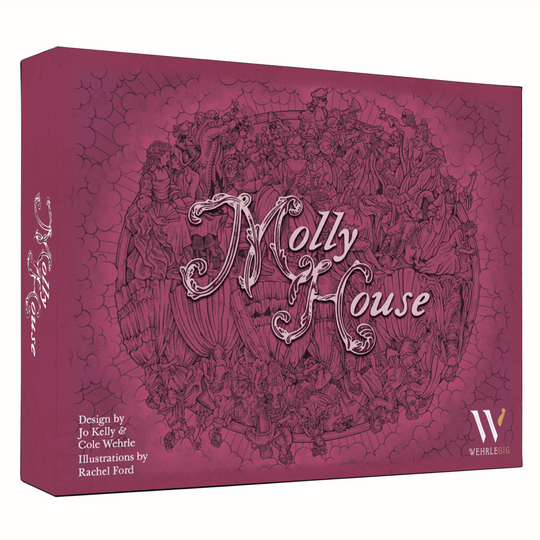 In Molly House, players take the roles of the gender-defying mollies of early eighteenth century London. Throw grand masquerades and cruise back alleys while evading moralistic constables who seek to destroy your community. Be careful, there may even be informers in your midst!
In Molly House, players take the roles of the gender-defying mollies of early eighteenth century London. Throw grand masquerades and cruise back alleys while evading moralistic constables who seek to destroy your community. Be careful, there may even be informers in your midst!
Over the course of an hour, players will draft hands of vice cards representing the different gestures, desires, and encounters that were frowned upon by the Society for the Reformation of Manners, a citizen group that sought to stamp out any behavior it deemed deviant in late 17th and early 18th century London. These cards allow players to host festivities with the help of their fellow mollies and create joy. But, those same cards can also lead players to be arrested and to the ultimate ruin of the molly house.
As players encounter the Society’s enforcers, they will often have to pay bribes or may be coerced into becoming informers for the Society. Informers must try desperately to undermine the community around Mother Clap’s Molly House without being discovered by their fellow mollies.
In Molly House, players must weigh their desires against their own sense of self-preservation. The rapid growth of London in the late 17th century allowed for greater anonymity, and the increase in population gave access to a wider range of people, allowing queer people to congregate in burgeoning communities. Molly House is a game about how these communities formed and flourished even in the shadow of great persecution. It is an intimate game about the very idea of intimacy.
Molly House is also a game about policing. Here the primary policing actors are not city officials but instead a citizen group, the Society for the Reformation of Manners, which sought to weaponize the legal apparatus of the city in order to destroy a community it perceived as a threat. Critically, this goal could not have been accomplished without the intimidation and eventual compliance of a handful of informers, drawn from the ranks of the house’s patrons.
Lastly, Molly House is a game about the practice of history itself. So much of queer history has been lost: hidden, suppressed, or outright destroyed. But, the story of the molly houses of the eighteenth century was protected in the most unexpected of places. As witnesses were pulled before the authorities in London, they gave their testimony and their accounts were preserved in the proceedings of the Old Bailey (London’s central criminal court). Despite the awful circumstances of their conveyance, these stories present illuminating first-hand accounts that are a tribute to the tremendous courage, playfulness, and defiance of their community.
Molly House is an effort to reconstruct that community in a game. We have done our best to build a world from these accounts that will hopefully give you some small sense of the remarkable community they built.
Gameplay
Molly House is a deep, interactive historical game bedecked in a fancy party dress.
Over the course of a game, players draft hands of vice cards representing the different gestures, desires, and encounters that were frowned upon by the Society for the Reformation of Manners, a citizen group that sought to stamp out any behavior it deemed deviant in late 17th and early 18th century London. These cards allow players to host festivities with the help of their fellow mollies and create joy. But, those same cards can also lead players to be arrested and might contribute to the ultimate ruin of the molly house.
A player’s desires are also their greatest liabilities. Over the course of the game, constables will patrol the streets and attempt to corner the players. When a constable is revealed, players will have to reveal one or more cards of that constable’s suit. In order to escape persecution, players will either have to renounce that desire or may take on a number of guilt tokens, which will lower their final score. These moments may offer arrested players a critical temptation. Through the intimidation and coercion of the constables, players may elect to become informers. This will set them against the other players and require them to destroy the Molly House in order to win the game. Informers must try desperately to undermine the community around Mother Clap’s historic molly house without being discovered by their fellow mollies.
However, unlike traditional hidden role games, Molly House does not rely on overt dishonesty or a predetermined cast of characters. The game does not require players to become an informer, and players may discover that every player or none had switched sides by the end of the game.
Together, Molly House offers players a novel twist on traditional secret role games where a player’s identity is as fluid as the cards in their hand. This 1-5 player game brims with opportunities for collaboration and coercion that bear the design hallmarks of a Wehrlegig game, but in a way that is approachable and easily playable within an hour or two.
Contains:
100+ Playing Cards
A Fully Illustrated 6-Panel Board
Large Classically Styled Wooden and Resin Playing Pieces
Screen Printed Guilt Tokens
Cloth Bag
Rulebook
and more!
1–5 Players
45–90 Min Playing Time
Suggested Age: 14+
It may not be possible to ship very heavy items outside of the Mainland UK.
Released: 17 July 2025